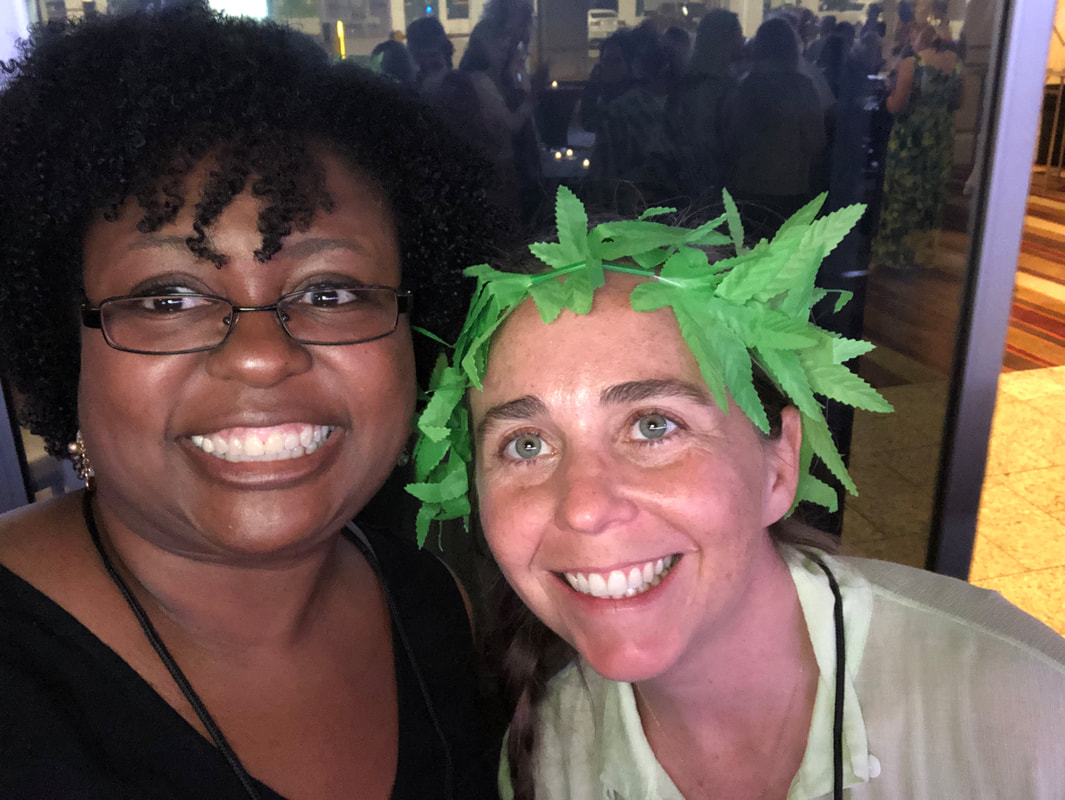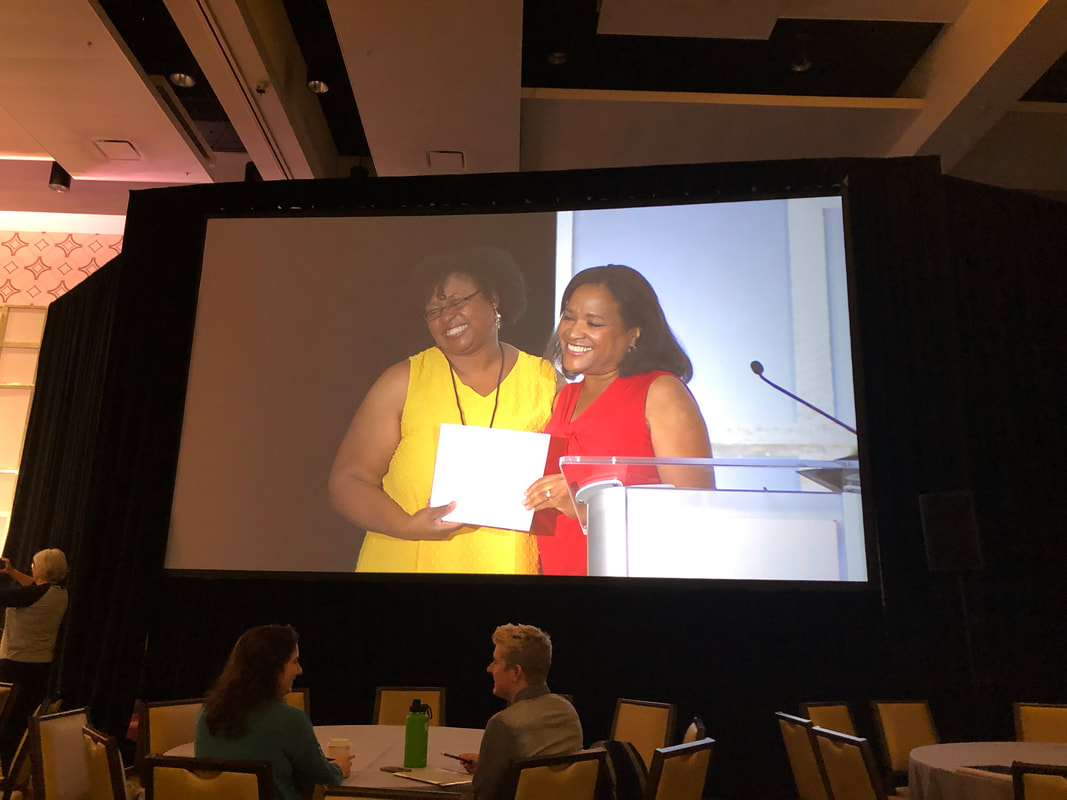|
Last spring I was honored to be awarded the inaugural Kweli Color of Children’s Literature Manuscript Award. Given in partnership with SCBWI, the award is presented to the manuscript deemed best during the critique sessions at the conference and includes an all-inclusive trip to the annual SCBWI Summer Conference in Los Angeles. I arrived in Los Angeles full of expectation and more than a bit of worry. I had never been to the Summer Conference, but I had heard much about how wonderful and amazing it was. And big. This year’s conference hosted over 1,100 attendees! As an introvert, I was afraid of being lost in teeming crowds of unfamiliar faces, but I needn’t have worried. Between the National Committee’s efforts to make scholarship and award recipients feel welcomed, the warm embrace from various SCBWI regions, and conversations with writing friends new and old, the summer conference was full of genuine connections and energy. What I most appreciated was that on the first morning a Welcome Breakfast was held for scholarship and award recipients. I met other writers and illustrators from around the country and heard about their recognitions, and we all were introduced to our hosts for the weekend. Bonnie Bader, SCBWI PAL Advisor, Tammy Brown, SCBWI Director of Community Marketing and Engagement, Sarah Baker, SCBWI Associate Executive Director, Kim Turrisi, SCBWI Director of Special Projects, and many others welcomed us and gave us warm smiles and familiar faces to check-in with during the weekend, if needed. If we got lost, had questions, or just needed to find a place to take a deep breath, they could help. After that, the conference became a whirlwind of keynotes and workshop sessions. This year’s keynotes were amazing and headlined by a talented array of authors and illustrators who shared their inspiration and knowledge. M.T. Anderson opened the conference with his keynote, “A House That Tries to Be Haunted.” Living in Boston, I connected with the idea that the places in which we walk and move daily are filled with centuries of stories just waiting to be covered. He entertained the audience with an account of his recent purchase of a “haunted” house. Mysterious noises and ghostly wails aside, he also found letters and artifacts from the family that once lived there and was able to connect with the adult children to share some of what he found. He reminded us that, “There are levels of history in any story lying beneath the floorboards, waiting to be discovered.” Reneé Watson opened her keynote, “The Craft of Making You,” with Ruth Forman’s poem, Poetry Rides the Bus, and she shared that poetry, like everything, “has a context and is in conversation with the things around us.” In Christian Robinson’s keynote, “You Are Here: Finding Yourself in Picture Books,” he talked about his journey as an illustrator and The Last Lecture by Randy Pausch, which he said has had a tremendous impact on his creative philosophy. Pausch, a Carnegie Mellon University professor who died from cancer in 2008, gave a lecture entitled, “Really Really Achieving Your Childhood Dreams” that focused on how we should overcome obstacles and make the most of each moment. Robinson summed up his thoughts about challenges in this way, “Brick walls are not there to keep us out. They are there to show us how badly we want something.” Yuyi Morales, author and illustrator of the Caldecott Honor Book Dreamers, talked about the power of love and storytelling to bridge divides. She said, “We learn how to love when we share what we know. No one knows everything and no one knows nothing.” I loved Meg Medina’s keynote about memory and its ability to help us find ourselves. When thinking about our memories, she said, “Ask why you remembered it. Ask the tough questions.” She ended her talk with a challenge, one that resonated with me in both my work as an educator and a writer. “Align your actions with your intentions.” The breakout sessions at the 2019 SCBWI Summer Conference also did not disappoint. I attended fabulous sessions led by Linda Sue Park on “Voice in Writing,” Bruce Coville on “The Essential Weaving of Plot and Character,” and Denene Miller entitled “Love Letters for Black Children: The Importance for Diverse Books,” as well as “writing room” sessions led by Linda Sue Park and Emma Dryden. I loved the writing rooms particularly because they gave me a chance to process everything I had learned over the course of the conference and begin to try out ideas on the page. I thought about Linda Sue Park’s thoughts about voice: “The object of voice is to produce in the reader a response that is as close to what you felt when you wrote it.” Bruce Coville reminded me that “A good story well-told is the basic desire of the human heart” and he shared many specific on how he crafts his work. Denene Miller workshop was inspirational and affirming. I took to heart her exhortation to publishers to “trust Black storytellers” but also for writers not to be afraid to reference Black culture in our own writing and advocate for what is authentic and true to our stories. The last day of the conference was for the Writers’ Intensives. I was thrilled to participate in a roundtable with Arthur A. Levine, President and Editor in Chief of Levine Querido. In the sessions, each writer shared 500 words of their manuscript and the editor spoke about the work for ten minutes, highlighting what was working, asking questions to the writer, and making suggestions to be considered in revision. There was often time for the writer to ask their own questions as well. Levine was a thorough professional, kind in his critiques, but he also helped each writer leave with actionable feedback. The other writers in the room listened quietly, each critique adding to their own craft knowledge. I ended the conference with the “Revising for Plot” session led by Elana K. Arnold & Brandy Colbert. Arnold described writing as “art, then craft, then business.” Writing a first draft is “art” but revision has “one foot in art and the other in craft.” Throughout the session, both she and Colbert shared numerous practical strategies for improving structure, tension, and character. When discussing theme, they shared, “Theme is never about a fact but an opinion.” Writers should ask themselves, “What belief about what it means to be human am I attempting to share with this book?” Three hours was not enough time to absorb all of the information shared, but I know I will refer back to my notes again and again as I work through my own manuscript revisions. Craft is such an essential part of why writers and illustrators came to the Summer Conference, but coming together as a kidlit community is what made it so enjoyable. The Woodstock West: 50 Years Later Party & Dinner was fun and allowed me a chance to meet new friends and connect IRL (in real life) for the first time with one of my writing mentors, middle grade author Robin Yardi. One of the true highlights of the weekend was the All Voices Inclusivity Social. Outside of the Kweli Color of Children’s Literature Conference, it was a rare opportunity to gather with other writers, illustrators, and publishing professionals from diverse backgrounds to chat informally about the industry, discuss recent efforts to move the dial forward on issues of race and inclusivity, and spend time in an affinity space. I also enjoyed connecting with writers and illustrators from my current region in New England over lunch and members of the region where I lived previously, the Midsouth, throughout the conference. Attending this year’s SCBWI Summer Conference is an experience I will remember. I truly felt part of a community of people committed to one wonderful endeavor, producing the best books for children possible. And even though we brought that unified vision with us, it was glorious to see how varied and beautiful those visions could be, as represented by the talented presenters and their work that was on display all weekend. I left Los Angeles with new ideas and motivation to write. The manuscript I wrangled with seemed tameable, and I had new energy to bring to my work table. Lastly, I am encouraged by SCBWI’s growing commitment to equity and inclusion. As the data continues to show, such asLee & Low’s Diversity in Publishing Baseline Survey, publishing is a predominantly white field and that impacts whose voices are heard and what gets published. As the recent Cooperative Children’s Book Center statistics reflect, the conversations about diversity have led to small gains in some areas, but there is still a long way to go. The inclusion of new scholarships and awards for writers and illustrators from historically marginalized groups, panels and workshops that include presenters from diverse backgrounds, affinity spaces for creators to connect with like-minded colleagues, and other initiatives that are still in the pipeline gives me hope. As a founding member of the New England SCBWI Equity and Inclusion Committee, I took back all I saw and heard to my own region to help SCBWI continue its mission to “support the creation and availability of quality children’s books” with the added goal of welcoming more writers and illustrators of color, Indigenous identity, and those who may identify as members of historically marginalized groups. When more voices are at the table, not only will amazing and quality books be created, but more children will get to see themselves in the stories they love. I can’t wait to be a part of this process and take my seat. I look forward to Kweli 2020, the 10-year anniversary of the conference! As the first recipient of the Manuscript Award, I have much to be grateful for. Amazing opportunities have come my way this year and I’ve met many, many wonderful writers and publishing professionals who have given me such helpful and encouraging advice. The Summer Conference was the final push I needed to finish my last round of edits on my manuscript DARK TIDE with my agent, and it is on submission. As it makes its way into the world, good things are happening and I hope to share an update at the conference. I also can’t wait to cheer on the next recipient of the Kweli Color of Children's Literature Manuscript Award as they take the stage in April!
Comments are closed.
|
stay informedarchives
October 2023
categories
All
|


 RSS Feed
RSS Feed